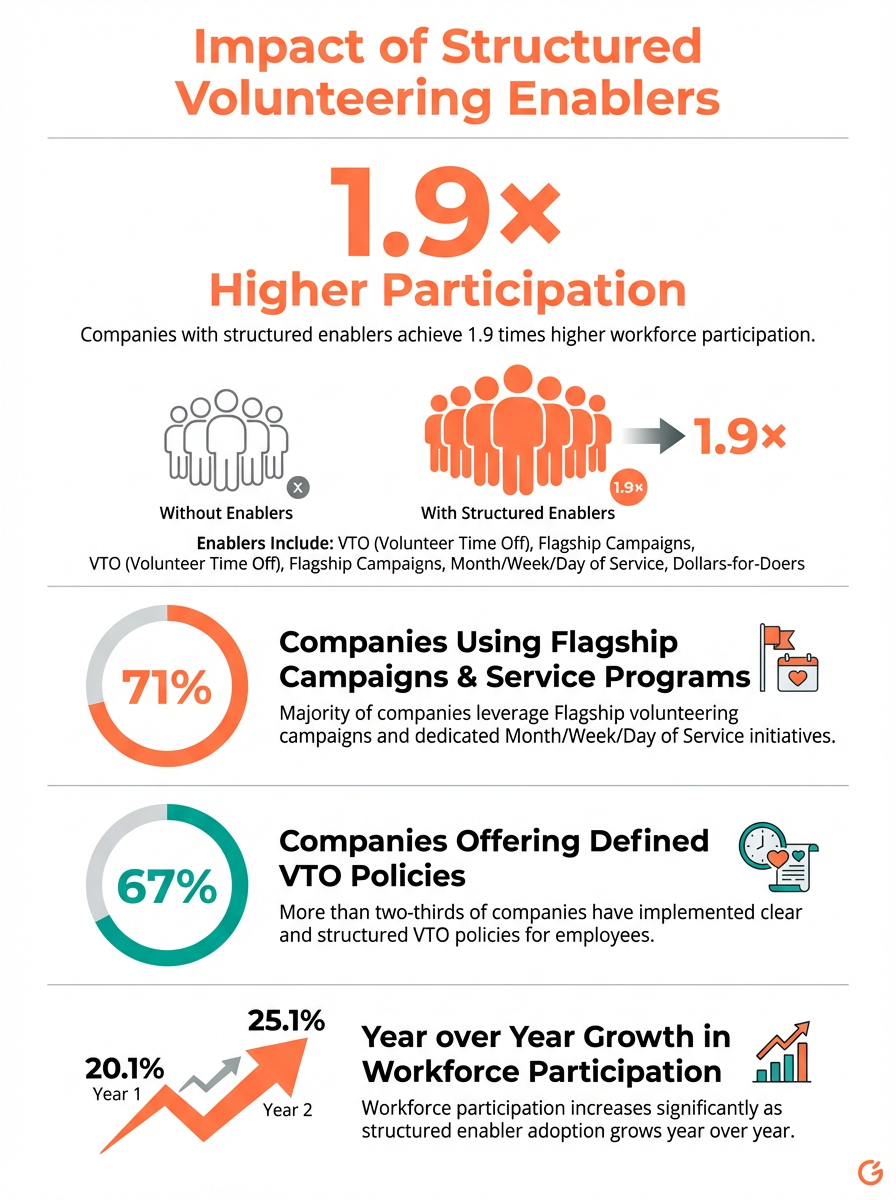Corporate Social Responsibility - Emerging Trends in 2026
Corporate Social Responsibility (CSR) is no longer just a checklist; it’s a revolution in the way businesses shape the future. From virtual volunteering for employees to team off-sites and conferences embedding volunteering events into their agendas, CSR activities blend purpose with impact in exciting ways. Let’s uncover the most recent corporate social responsibility trends reshaping the world, and why they matter in 2026.
The idea of corporate social responsibility gained traction in the 1970s, and its definition has been evolving. From corporate philanthropy being the only choice for organizations to fulfill corporate social responsibility to the evolution of new trends, the corporate world is always on a journey to find the next big thing.
Today’s CSR landscape is defined by smarter, more intentional programs, where AI supports impact measurement, employees contribute skills, participation replaces donations as the core metric, and storytelling adapts to how people actually consume content.
Did you know? Workplace volunteering continues to gain momentum, with roughly 77% of companies reporting higher employee participation in volunteer programs in 2024 compared to the previous year.
Having a sense of purpose is a driving force in strengthening an organization's social values. Corporate Social Responsibility allows the company to fulfill its purpose and empower its employees, stakeholders, and customers. Moreover, CSR activities also drive press interest in the company, which can boost brand awareness and online popularity. With the changing world order, corporate social responsibility will soon be a non-negotiable driving factor in a company's growth.
Here are the top recent corporate social responsibility trends shaping 2026:
Top 10 Trends in CSR to Watch in 2026
1. AI Is Reshaping How CSR Programs Are Designed and Measured
One of the most defining current trends in CSR is the use of AI to move CSR from intuition-led to insight-led. Organizations are beginning to use AI to analyze participation patterns, predict engagement drop-offs, surface nonprofit needs faster, and streamline impact reporting. As highlighted by FSG, AI is becoming a foundational capability for social impact teams, not just a productivity tool.
To keep pace, companies should start treating AI as an augmentation layer for CSR teams, not a replacement. This means experimenting with AI-supported analytics, using automation to reduce reporting fatigue, and building internal guardrails for ethical AI use in social programs. Those who adopt early will be better positioned to scale impact without scaling complexity.
Also Read: The AI Literacy Divide in Volunteering
2. Skills-Based Volunteering Is Becoming a Core Workforce Strategy
Skills-based volunteering is emerging as both a recent trend in CSR and a workforce development lever. Instead of focusing only on time-based volunteering, companies are channeling employee expertise into nonprofit and community challenges, aligning social impact with talent development and future-ready skills.
Organizations can lean into this shift by mapping critical internal skills to real-world social needs, partnering with nonprofits that can absorb specialized expertise, and recognizing skills-based contributions as part of employee growth journeys. This approach strengthens retention while delivering deeper, longer-lasting impact.
Also Read: Everything You Need to Know about Skills-Based Volunteering
3. Structured Volunteering Is Replacing One-Off CSR Events
According to the Volunteering Quotient Report 2025, companies with structured enablers like Volunteering Time Off and flagship campaigns see significantly higher participation rates. This reflects a broader future trend in CSR, where access and consistency matter more than occasional enthusiasm.
Impact of Structured Volunteering Enablers

- Companies that adopt structured enablers such as Volunteering Time Off (VTO), Flagship Campaigns, Month/Week/Day of Service, or Dollars-for-Doers see up to 1.9× higher workforce participation compared to companies without those enablers.
- Flagship volunteering campaigns and Month/Week/Day of Service programs were among the most widely adopted enablers, with ~71% of companies using them, and ~67% offering a defined VTO policy.
- Among companies reporting data for two consecutive years, workforce participation increased from 20.1% to 25.1% year over year as enabler adoption grew.
Overall Workforce Participation Data (Context)
- Across the 222 companies in the report, the median workforce participation rate in volunteering was 22.2%, up from 20.1% the previous year.
- Average volunteering hours per volunteer also rose, from 6.87 to 7.21 hours annually, showing deeper engagement alongside broader participation.
Organizations looking to strengthen engagement should move beyond ad hoc events and build predictable, repeatable volunteering rhythms into the employee experience. When volunteering is easy to access and embedded into the work year, participation becomes habitual rather than optional.
4. CSR Storytelling Is Adapting to Short-Form, Data-Driven Content
Storytelling remains central, but how stories are told is changing fast. One of the more visible current trends in CSR is the shift toward short-form, mobile-first formats like vertical videos, social reels, and snackable impact summaries. At the same time, stakeholders increasingly expect stories to be backed by data, not just emotion.
Why Short-Form Content Works in the Social Impact Landscape
- Emotional connection, fast: Short videos convey emotions like hope, empathy, and progress within seconds, helping audiences connect before attention drops.
- Built for sharing: Snackable formats spread quickly across social platforms, allowing impact stories to reach far beyond an organization’s immediate network.
- More accessible storytelling: Bite-sized content makes complex social issues easier to understand, especially for audiences less likely to engage with long-form reports.
- Aligned with platform behavior: TikTok, Instagram Reels, and YouTube Shorts dominate content consumption, offering large, highly engaged audiences for social impact stories.
- Lower barriers to entry: Short-form content requires less time commitment from viewers, increasing completion rates and recall.
How Social Impact Teams Can Use Short-Form Content Effectively
- Lead with strong hooks: Capture attention in the first few seconds using emotion, movement, or a compelling visual moment.
- Design mobile-first: Prioritize vertical formats built for on-the-go viewing and scrolling.
- Follow cultural cues: Leverage relevant trends, sounds, or formats to make content feel native rather than promotional.
- Center human stories: Focus on people, progress, and shared humanity rather than polished campaigns or heavy statistics.
- Pair emotion with clarity: Use simple visuals or captions to reinforce the message without overwhelming the viewer.
To stay relevant, companies should rethink CSR communication as a content ecosystem. That means pairing strong impact metrics with human stories, repurposing CSR moments into short-form content, and designing stories that work across LinkedIn, internal platforms, and ESG disclosures. The goal is credibility and resonance, not volume.
5. Employee Participation Is the New Measure of CSR Success
Among the most important recent trends in CSR is the shift in how success is defined. Companies are increasingly tracking volunteer participation, hours per employee, and repeat engagement instead of focusing solely on dollars donated.
This signals a mindset change; CSR is no longer just about writing checks, but about activating people. Organizations that want to lead in this space should prioritize visibility into participation, normalize volunteering as part of the work culture, and report engagement metrics alongside traditional CSR outputs.
6. CSR and ESG Are Becoming Operationally Intertwined
A growing future trend in CSR is the convergence of CSR and ESG. Social initiatives are now expected to support governance goals, workforce wellbeing, and long-term sustainability commitments. Data shows that industries with strong ESG alignment report higher CSR participation and maturity.
To adapt, companies should stop treating CSR as a parallel track and instead integrate it into ESG planning, disclosures, and leadership conversations. When CSR outcomes clearly support ESG goals, programs gain longevity, credibility, and executive buy-in.
7. Companies Are Narrowing Their CSR Focus to Drive Deeper Impact
Rather than supporting many causes lightly, organizations are concentrating on fewer focus areas such as education, community welfare, sustainability, and DEI. This is one of the most consistent current trends in CSR, driven by the need for measurable, long-term outcomes.
Companies can respond by clearly defining their priority cause areas, building multi-year partnerships, and aligning volunteering, funding, and storytelling around the same themes. Focus creates clarity for employees and stronger outcomes for communities.
A strong example of this approach is Salesforce. Through its long-standing 1-1-1 model, Salesforce has consistently centered its social impact around education, workforce development, and community resilience. Rather than rotating causes annually, the company commits a fixed percentage of equity, employee time, and product resources to these priorities, enabling sustained partnerships and scalable impact. This focus has helped Salesforce engage employees globally while demonstrating measurable outcomes across education and nonprofit capacity building.
Similarly, Patagonia’s CSR strategy is tightly anchored to environmental protection. By concentrating its funding, advocacy, and storytelling almost exclusively on climate action and conservation, Patagonia has built deep credibility in this space, mobilizing customers and employees around a shared purpose rather than a broad mix of unrelated initiatives.
For organizations adopting this model, focus creates alignment across the CSR ecosystem. When volunteering programs, funding decisions, and storytelling all reinforce the same cause areas, employees better understand where their efforts fit, nonprofits benefit from long-term collaboration, and impact becomes easier to track and communicate. As CSR matures, depth, not breadth, is emerging as the marker of effective social responsibility.
8. CSR Technology Platforms Are Becoming the Backbone of Programs
As CSR programs grow more complex, platforms are playing a central role in execution, tracking, and reporting. The Volunteering Quotient Report shows higher participation rates among companies that use external CSR platforms, reinforcing this recent trend in CSR.
Organizations that want to scale effectively should invest in technology that reduces friction for employees, simplifies nonprofit coordination, and provides real-time visibility into impact. Platforms are no longer just operational tools; they are strategic enablers.
9. Proven Models Like Dollars for Doers Continue to Deliver Value
While innovation accelerates, established mechanisms like Dollars for Doers remain steady. Roughly 40% of companies continue to run these programs, demonstrating their role as a durable component of future trends in CSR.
Rather than phasing these out, companies are strengthening them by tying grants to participation milestones and spotlighting collective impact. These models work best when positioned as amplifiers of employee effort rather than standalone incentives.
10. CSR Leadership Is Becoming More Adaptive and Locally Grounded
FSG highlights adaptive leadership and local engagement as defining elements of the future of social impact. As trust in large systems fluctuates, companies are increasingly investing in community-level partnerships and flexible CSR strategies that can respond to evolving needs.
To stay ahead, organizations should balance global CSR frameworks with local relevance, empower regional teams, and listen more closely to community partners. The most effective CSR strategies in 2026 will combine long-term vision with on-the-ground responsiveness.
These emerging trends in CSR are redefining corporate responsibility and creating opportunities for meaningful impact. From tackling climate change to empowering employees through virtual volunteering, companies are embracing innovative approaches to making a difference.
Ready to revolutionize your CSR strategy? Start exploring CSR activities that align with your organization’s purpose today!
Frequently Asked Questions
1. What are the 4 types of CSR?
The 4 main types of Corporate Social Responsibility (CSR) are:
- Environmental Responsibility – initiatives like reducing carbon footprints, energy efficiency, and green supply chains.
- Ethical Responsibility – ensuring fair treatment, transparent practices, and ethical decision-making.
- Philanthropic Responsibility – donating funds, resources, or time to social causes.
- Economic Responsibility – balancing profitability with sustainable and socially responsible business practices.
2. What is the CSR trend in 2025?
The key CSR trends in 2025 include virtual volunteering, sustainability initiatives, diversity and inclusion programs, supporting small businesses, localization, transparency, and purpose-driven storytelling. Companies are moving beyond philanthropy to embed CSR into their core business strategy.
3. What is the 2% rule of CSR?
In India, under the Companies Act 2013, eligible companies must spend at least 2% of their average net profits from the last three years on CSR activities. This includes projects related to education, healthcare, environment, rural development, and social equity.
4. What are examples of emerging trends in CSR?
Some emerging trends in CSR are climate action initiatives, DEI (diversity, equity, and inclusion) campaigns, transparent business reporting, and local community empowerment. These trends ensure businesses create both economic and social value.
5. How does virtual volunteering fit into CSR?
Virtual volunteering allows employees to contribute skills, time, and resources online, making CSR more accessible and scalable. Activities include online mentoring, digital fundraising, translation, and remote nonprofit support.
6. How can companies measure CSR impact?
Companies measure CSR impact through KPIs such as volunteer hours, funds raised, beneficiaries reached, carbon footprint reduction, and stakeholder satisfaction surveys. Transparent reporting helps build accountability and trust.












